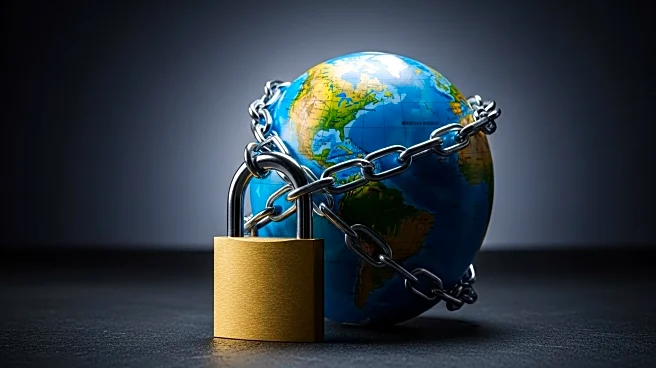What's Happening?
Venezuela is currently detaining a growing number of foreign nationals, including humanitarian workers, amid heightened economic sanctions and political isolation from the United States and Europe. Manuel Tique, a humanitarian worker from Colombia, is among those detained by President Nicolás Maduro's government. Tique was arrested while attempting to enter Venezuela to conduct a workshop on monitoring food and medicine distribution. Human rights groups have described his detention as a forced disappearance. The U.S. has increased military presence in the Caribbean, conducting anti-narcotics operations, which Maduro perceives as a potential threat. The Venezuelan government accuses many detained foreigners of plotting against Maduro, although human rights organizations argue these individuals are mostly tourists and aid workers. The situation has led to increased uncertainty for the families of those detained, as diplomatic efforts to secure their release continue.
Why It's Important?
The detention of foreign nationals in Venezuela highlights the complex geopolitical tensions between the country and Western nations, particularly the United States. The situation underscores the challenges faced by humanitarian workers and foreign nationals operating in politically unstable regions. The U.S. sanctions and military presence in the Caribbean could further strain relations, potentially impacting diplomatic negotiations for the release of detainees. The detentions may also deter international aid efforts and tourism, affecting Venezuela's already struggling economy. Additionally, the situation raises ethical concerns about the use of foreign nationals as leverage in political disputes, potentially setting a dangerous precedent for international relations.
What's Next?
As tensions escalate, the U.S. and other affected countries may increase diplomatic pressure on Venezuela to release detained foreign nationals. The presence of U.S. naval forces could lead to further military actions, potentially complicating diplomatic efforts. Human rights organizations are likely to continue advocating for the detainees' release, urging governments to link trade and security cooperation to their freedom. The situation may prompt countries to issue travel warnings, advising citizens against visiting Venezuela. The international community may explore alternative strategies to address the humanitarian and political crisis without conceding to Maduro's demands.
Beyond the Headlines
The detention of foreign nationals in Venezuela raises broader ethical and legal questions about the use of individuals as political pawns. It highlights the risks faced by humanitarian workers in conflict zones and the need for stronger international protections. The situation may influence global policies on diplomatic negotiations and sanctions, prompting discussions on balancing humanitarian concerns with political objectives. Long-term, the crisis could lead to shifts in international relations, affecting how countries engage with authoritarian regimes and address human rights violations.








